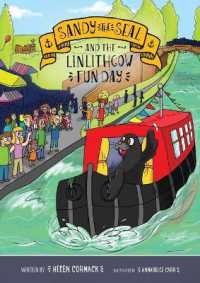- ホーム
- > 洋書
- > 英文書
- > Science / Mathematics
Full Description
This book draws on world-wide experiences and valuable lessons to highlight community-ecosystem interactions and the role of traditional knowledge in sustaining biocultural resources through community-based adaptations. The book targets different audiences including researchers working on human-environment interactions and climate adaptation practices, biodiversity conservators, non-government organizations and policy makers involved in revitalizing traditional foods and community-based conservation and adaptation in diverse ecosystems. This volume is also a source book for educators advocating for and collaborating with indigenous and local peoples to promote location-specific adaptations to overcome the impacts of multiple biotic and abiotic stresses.
Note: T&F does not sell or distribute the hardback in India, Pakistan, Nepal, Bhutan, Bangladesh and Sri Lanka. This title is co-published with NIPA.
Contents
1. The Food/Medicine/Poison Triangle: Implications for Traditional Ecological Knowledge Systems of Indigenous Peoples of British Columbia, Canada 2. Integration into the Market Economy and Dietary Change: An Empirical Study of Dietary Transition in the Amazon 3. The Loss of Local Livelihoods and Local Knowledge: Implications for Local Food Systems 4. The Seasonal Migration of Thai Berry Pickers in Finland: Non-wood Forest Products for Poverty Alleviation or Source of Imminent Conflict? 5. Sustainable Management of Natural Resources and Biocultural Diversity for Subsistence Livelihoods: A Cross Cultural Study 6. Status and Contribution of Non-cultivated Food Plants Used by Dawro People in Loma District, South Ethiopia 7. Biocultural Resources and Traditional Food Systems of Nyishi Tribe of Arunachal Pradesh (India): An Empirical Learning on the Role of Mythology and Folklore in Conservation 8. New Shoots, Old Roots - the Incorporation of Alien Weeds into Traditional Food Systems 9. Edible Fungi in Mesoamerican Lowlands: A Barely Studied Resource 10. Menu for Survival: Plants, Architecture, and Stories of the Nisga'a Oolichan Fishery 11. Salmon Food Webs: SAANICH First Nation Peoples' Intrinsic Interconnectedness to Salmon Fishing and Conservation on Southern Vancouver Island, British Columbia, Canada 12. Tsampa of Ladakh: Adaptation of a Traditional Food at Higher Altitude and Emergent Changes 13. Bioculturally Important Indigenous Fruit Tree Mahua (Madhuca spp.; Sapotaceae): It's' Role in Community-Based Adaptive Management







